August 14, 2019
Zambia is a popular tourist destination where visitors can fully enjoy natural attractions including Victoria Falls and the country's many national parks. Since becoming independent in 1964, Zambia has maintained friendly relations with neighboring countries, supported peace-building activities in Angola, the Democratic Republic of the Congo (DRC) and Rwanda, and accepted refugees. The country experiences little domestic political turmoil and is gaining renown as a model of democratization in Africa.
Today the entire nation of Zambia is coming together to reform its economy, which is dependent on mineral resources such as copper. Cooperation to promote rice growing is contributing to economic diversification. JICA supports the Zambian government's effort, begun in the 1980s, to promote rice cultivation. Through the "Rice Dissemination Project," we are experimenting on and researching rice growing and putting a structure in place to popularize it. We plan to continue supporting experimentation, research and the promotion of market-oriented rice cultivation.
JICA's cooperation has also produced results in the health-care field. For example, an Ebola virus diagnostic kit developed in a project to strengthen Zambia's capacity to research and investigate infectious diseases was used during an Ebola outbreak in the neighboring DRC, and JICA supported a project to verify the effectiveness of anti-mosquito paint developed by a Japanese company. Sales of the paint have begun in Zambia.
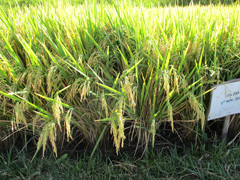
The Rice Dissemination Project test field that recorded the most abundant harvest in Zambian history
Cooperation to Vitalize Industry and Build Base Infrastructure
Zambia, with its abundant mineral resources, exports copper and cobalt, which account for 70 percent of its total exports. The country's economy had been growing steadily when the price of copper fell internationally in 2012, dealing it a significant blow. The shock inspired the government to work to create a robust economic foundation by diversifying industry so that it no longer depended on mineral resources alone. This effort included activating agriculture and the private sector.
In response to this effort by Zambia, JICA is providing cooperation that emphasizes activating industry, including developing the private sector and stimulating agriculture, and creating and strengthening basic infrastructure that supports the economy. The latter effort includes both hard infrastructure such as electric power and roads and soft infrastructure such as education and health care.
These areas conform to the priority assistance areas Japan announced at the Sixth Tokyo International Conference for African Development (TICAD VI) held in 2016: "Promoting Economic Restructuring Through Economic Diversification and Industrialization," "Social Stability for Shared Prosperity" and "Resilient Health Systems for Quality of Life."
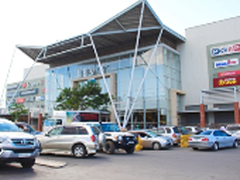
Shopping mall in Lusaka, the capital of Zambia.
Aiming to Use Rice to Diversify Agriculture
In Zambia, the staple crop maize (corn) is widely produced through generous assistance from the government, including seeds, fertilizer and a maize-purchasing system. Maize subsidies are meaningful as a way to guarantee a certain standard of living for farmers, but they reportedly reduce farmers' motivation to innovate to increase their productivity. That is why the government is encouraging the diversification of crop cultivation. In recent years, demand for rice has increased and the government is positioning rice as a priority crop. With the National Rice Promotion Strategy it decided on in 2016, the government has set a goal of increasing production by 50 percent by 2020.
JICA has been supporting the promotion of rice growing in Zambia in many ways since the 1980s, including by improving irrigation. In that process, JICA has learned that rice productivity can be improved significantly by growing rice in wetlands known as dambos that were thought to have little utility, by introducing new varieties including New Rice for Africa (NERICA) and by improving growing techniques.
Through the "Rice Dissemination Project," we are enhancing Zambia's rice research capacity and intensifying activities to popularize rice growing. The project is scheduled to end in September, but under a new follow-up project, we will continue our support for research and assistance to popularize market-oriented rice growing and increase farmers' incomes.
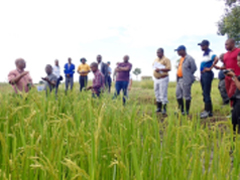
A rice researcher JICA supported for many years gives an explanation to visitors at a test field he heads.
Infectious Disease Research Begins to Bear Fruit
Among viral infectious diseases such as Ebola and avian influenza that affect both humans and animals, there are many whose diagnostic methods and mechanisms for entering human society remain a mystery. Such diseases are a major threat to the international community. The landlocked African country of Zambia is always exposed to the threat of infectious diseases coming across the border from neighboring countries, and adequate education, research and surveillance structures for preventing this are not yet in place.
At the University of Zambia's School of Veterinary Medicine, from 2013 to 2018, JICA has conducted the Project for Surveillance of Viral Zoonoses in Africa, cooperating to establish a research system in Zambia and enhance the country's surveillance capacity. A prototype rapid diagnostic kit developed in the project was used during an Ebola outbreak in neighboring DRC in May 2017. The diagnostic kit, which requires no special equipment and can produce results in about 15 minutes, can be used in areas with no medical facilities, and there are high expectations for its future use.
To expand on these results, JICA will begin the new program "Project for Epidemiology of zoonotic virus infections in Africa" in June 2019 in Zambia and the DRC.
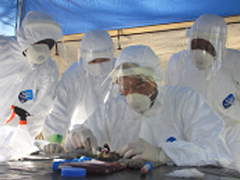
Taking blood samples from bats captured to ascertain natural hosts of the Ebola virus
Using a Japanese Company's Technology to Prevent Malaria
In October 2018, Kansai Plascon Zambia, an affiliate of Kansai Paint Co. Ltd., began selling the home-use Kansai Anti-Mosquito Paint (AMP) in Zambia. Mosquitoes that fly into rooms have a habit of always landing on a wall or ceiling before sucking human blood, and that is when a compound in this paint causes them to lose their ability to fly. Kansai Paint used JICA's Scheme for Disseminating Private-Sector Technologies, which supports Japanese companies aiming to solve problems facing developing countries, to survey general households and confirm the safety and effectiveness of its paint, so the Zambian government granted the company a license to import paint and sell it.
The number of people infected with malaria in Zambia has reached 60,000 per year and the number of malaria fatalities more than 3,000. The government is aiming to eradicate malaria by 2021. The Project to Promote and Disseminate Paint that Controls Infections in Zambia plans to work to reduce the cost of the paint so it will be more accessible to people with low incomes.
AMP is useful in preventing the spread not just of malaria, but also of dengue fever and other mosquito-borne diseases. Zambia is the first country in Africa where AMP is being sold, but if neighboring countries accept the paint, it is expected to lead to a decrease in the number of Africans afflicted by mosquito-borne infectious diseases.
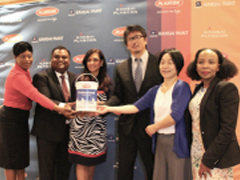
When sales began of home-use anti-mosquito paint, people involved in the project gave a presentation.




scroll